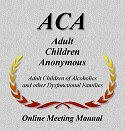

|
|
|---|
MRP Site Navigation
Home
MN
12 Step Groups
MN Treatment Centers
National
AA Intergroups
National NA Intergroups
National Al-Anon Intergroups
ACA Meeting Manual
NEW!
Other Recovery Groups
Online Meetings
AA History
Recovery Events
Links
Alcoholism
Links
Codependency
Links
Commercial
Sites
Drug
Addiction Links
Eating
Disorder Links
Gambling
Addiction Links
Gay
& Lesbian Links
Mental
& Emotional Health
Religion
& Spiritual Links
Sexual
Addiction Links
Women's
Issues
Bookstore
Audio
Reading
Room
AA Literature
Recovery Articles
Personal
Stories
People In Recovery
Graphics
Supporting the Minnesota Recovery Page
Contact Us
| Main ACA Page | ACA Resources | ACA Related Links | Other ACA |
|
Intro |
Core Material |
Handouts 1 |
Handouts 2 |
|
Handouts 3 |
Poetry & Music |
Articles |
Personal Stories |
|
Meetings |
Meeting Formats |
|
ACA meetings help us put some order to the many years of seeking answers in books, psychotherapy sessions, self-help workshops, and in conversations with people who didn't understand and couldn't help. Our goal is a life of serenity. We attend ACA meetings to better understand our past and our present, which gives us the ability to improve our future. While growing up, Adult Children of alcoholics and other dysfunctional family systems learned: Don't Talk, Don't Trust, Don't Feel. When we lived in a dysfunctional, addictive, home, no one listened; we were told our feelings were wrong. We took care of other people and neglected ourselves. In ACA meetings, we break those rules. We talk about what happened then and what is happening now. We feel the feelings we could not feel then and get in touch with our feelings today. We come to realize that all we attempted and all our experiences are valuable parts of our growth and have led us to this new beginning. As we begin to talk, trust and feel, we break the patterns which were necessary to our survival as children but which now prevent us from fully experiencing life. Many of us come to our first meeting distressed and in some stage of unresolved grief. We need to understand what happened to us as children. We need to know that there really was and is a problem—that we aren't just reacting to something we imagined. The Twelve Steps of ACA help us with the effects alcoholism or any other family dysfunction has in our lives. In ACA meetings we find the safety and love to experience what we never allowed ourselves to feel or express before. We trust the people in the meetings to respect our feelings and treat what we say as confidential. In ACA we learn to lead full lives through the healing that belongs with participation at meetings. We can expect to get in touch with emotions and experiences we have denied—perhaps fear, perhaps anger. We may discover unexpressed love. We hope you will join us.
Congratulations It is indeed confusing to walk into an ACA meeting for the first time. Congratulations on your bravery. Do you qualify for membership? Perhaps you may feel that you are not entitled to be in this group. There may have been no alcoholism in your family. The only requirement for joining this group is that you identify with The Problem. Adult Children of alcoholics, addicts, compulsive gamblers, overeaters, debtors, sexaholics, rageaholics, workaholics, abuse-aholics and of other dysfunctional family systems have found help and acceptance in these meetings. If you identify with us, you are welcome to consider yourself one of us. In this group you are welcome to share the confusion and pain that has haunted you. There is enough love here for all of us. You may hear words that are new to you: "lost child," "hero," "scapegoat," "mascot," "codependency," "the child within," etc. Read the literature or simply listen and you will understand. You may also hear about spiritual recovery and the Twelve Steps. While this is not a religious organization and many of us have found that a belief in a power greater than ourselves has been helpful, it is not necessary to have religious beliefs, or even to believe in God to participate in this program. Attend six meetings before you decide whether ACA is for you. This is the traditional wisdom. Why not two or three? That's a good question. We often need more than a few meetings to help us get our bearings and to overcome our initial denial. What you hear may make you sad, uncomfortable or angry. Try to examine your feelings. You may find yourself getting physical symptoms: dozing off, getting dizzy, feeling nauseated, anxious or headachy. All are typical. Talking helps. There are some things that you should know about ACA meetings. First and most important, is that I am here for my health and my recovery, so the following are some general guidelines we try to follow to create a safe meeting atmosphere:
In addition, we ACA's are each responsible for our own recovery, which comes through the development of our inner voice. Remember, the overall solution is to become your own loving parent. The program is unique to each of us: we must learn to trust ourselves, not authority. We have no officials and our chairpersons are only trusted servants. We have no spokesperson, representatives or experts. Meetings are chaired by a different person each time. When meeting problems come up we talk about solutions in monthly business meetings. All are encouraged to attend. Our last words at each meeting, before going our separate ways are ... KEEP COMING BACK, IT WORKS. |

Days of Healing, Days of Joy
Daily Meditations For
Adult Children

Women In Recovery
Rainbow Medallion
Serenity Prayer Butterfly Rainbow Medallion

Recovery Ring
in Sterling Silver
![]()
![]()





